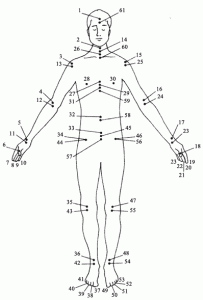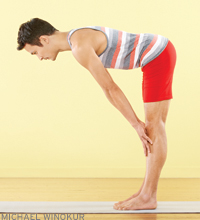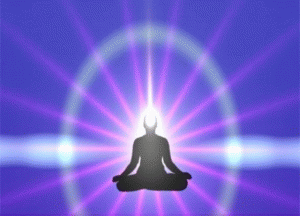The art and science of relaxation
 The need to learn effective relaxation is due to several reasons: firstly, vascular circulation is normalized; secondly, psychosomatic tension is removed (there is a deep purification of the subconscious); thirdly, good relaxation after intensive training contributes to a better consolidation of the psycho-energetic effect of yoga practice.
The need to learn effective relaxation is due to several reasons: firstly, vascular circulation is normalized; secondly, psychosomatic tension is removed (there is a deep purification of the subconscious); thirdly, good relaxation after intensive training contributes to a better consolidation of the psycho-energetic effect of yoga practice.
Let’s go straight to practice. One of the simple and interesting relaxation methods is called “61 Point Relaxation”. The method is to gradually relax your body, focusing all your attention on each point, causing successively in each of the 61 points sensations of heaviness, heat and pulsation.
The first point is on the forehead, just above the interbrow. It is necessary to focus on it and relax it, causing a feeling of heaviness, warmth and pulsation. To do this, you can repeat to yourself (keeping your attention on the point): “I feel heaviness, warmth and pulsation.” After the desired sensations are achieved, go to the next point, which is located on the neck, then go down the arm, then, passing through the fingers, again go through the already passed points on the arm, returning to the neck. Then we relax the left hand, return to the neck, go down the torso, relax the legs in a similar way as the hands, and then again pass along the torso and neck, returning to the very first point on the forehead. It is necessary to remain completely still and as relaxed as possible throughout the practice.
The 61 point method is very effective. At first, it may take you up to 20-30 minutes to relax along it, however in the future (as you practice) this time will be significantly reduced.
Relaxation is an art, as there are various practices that can be developed and used to achieve relaxation of the mind and body. But relaxation is also a science, as it is based on solid scientific facts.
At first glance, relaxation seems simple – a person just closes his eyes and sleeps. But in fact, achieving relaxation – deep relaxation – is very difficult for most people. During rest, their mind is in a state of confusion, the body is constantly moving and turning, the muscles twitch. The biggest obstacle that needs to be overcome is to force yourself to take active steps to achieve relaxation, to study and apply the various methods available. Since most people cannot relax in the real sense of the word, they will find that gaining this ability will completely change their lives. It is very simple, but it brings amazing results.
By relaxation, we mean the release of tension in the mind and body for a period of time sufficient for complete relaxation and restoration of strength.
It is for this purpose that sleep serves, but due to the fact that the daily life of most people is full of tension, sleep no longer performs its functions properly. Many people find that they do not relax even in their sleep – they continue to worry and try to solve their problems. This does not lead to the rest that the mind and body require. In the morning, people get up still tired, and this condition persists throughout the day.
There is a vicious circle – for they again go to bed with the accumulated stress of the day and, in addition, with the fatigue that resulted from the many nights when they did not get enough rest during sleep. It is not surprising that on weekends many people spend most of their time sleeping, they need it. That is why a modern person needs to know special methods that cause relaxation. Sleep is still necessary, but it should be supplemented with techniques that allow you to quickly and effectively get rid of excitement and stress.
This seems to be a contradiction, and yet it is true: people who are able to relax easily can work more, need less sleep, live a fuller life and, as a rule, maintain smoother social relations in all areas of life.
You may ask: “What about lazy or listless people – are they completely relaxed, and yet they don’t work?” Actually, this is a completely different matter. A lazy person is either so full of internal doubts and anxieties that he is not able to direct his willpower to any activity or achieve any goal, or his mentality is such that he does not want to do anything at all. All this is different from relaxation. A person who knows how to truly relax can restore his mental and physical strength and, if necessary, focus them in one direction. In fact, this is the willpower — the ability to direct one’s whole being toward one goal without being distracted by anything else.




